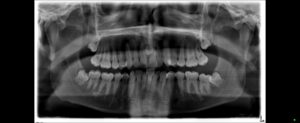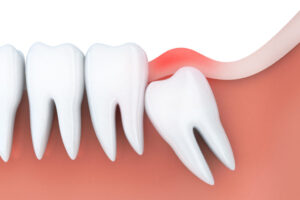If your tongue has developed rippled or wavy indentations on the outermost sides, it could be a scalloped tongue. Although it is rarely painful or a sign of an underlying medical condition, it could affect normal oral functionalities. It is known by other names as pie-crust tongue, crenated tongue, rippled tongue, or lingua indentata. Knowing symptoms and possible causes of the scalloped tongue will help you prevent the occurrence and seek medical intervention in time.
What Causes Scalloped Tongue?
The most common cause of indentation in the side of the tongue, directly next to the adjacent teeth, is the swelling or inflammation of the tongue. The immediate cause of tongue swelling, also called macroglossia, could be some underlying conditions. But swelling of the tongue could compress it against the teeth, thus creating rippled or scalloped tongue. So, knowing related symptoms could help you understand the root cause and consult your oral care specialist accordingly. Some of the common causes of tongue swelling and resulting scalloped tongues include:
Bad Activities
Activities like cheek sucking, teeth picking, teeth grinding are considered bad oral activities, also called parafunctional activities. It is one of the most common causes of the scalloped tongue. Oral care professionals link parafunctional activities with poor dental alignment, sleep disorder, stress, systematic disorders, or trauma. Your dentist or oral care professional might recommend occupational therapy to stop bad habits along with inflammation control medication.
Allergic Reaction, Infection, or Injury
If you are allergic to certain food items, like peanut butter, your immune system might cause inflammation, thus scalloped tongue. The swelling could be due to injury and infection. An oral care specialist will examine your condition and prescribe medication accordingly to help you heal quickly.
Genetic Condition
Tongue swelling or macroglossia could be due to genetic factors. Genetic disorders like down syndrome, hyperthyroidism, or Apert syndrome could cause tongue swelling and lead to the scalloped tongue.
Infiltrative Conditions
If you have long-term inflammation conditions or infiltrative conditions that result in an abnormal buildup of tissues it could affect your tongue as well. Some of those conditions which could cause scalloped tongue are tuberculosis, hypothyroidism, sarcoidosis, amyloidosis, lipoid proteinosis, and angioedema.
Hypothyroidism
The change in thyroid level is natural, but when it falls below normal it could lead to hypothyroidism. Some of the common symptoms are hair loss, fatigue, muscular pain, low blood pressure, along with a scalloped tongue. Hypothyroidism could trigger the deposition of protein in your organs, including the tongue. The swelled tongue will lead to indentations along the side of the tongue.
Dehydration
If your water intake is below average or some conditions are causing dehydration, your tongue would swell. Excessive swelling will compress against teeth, thus creating indentations along the edges.
Nutritional Deficiencies
The proper functioning of organs needs an optimum supply of nutrients. If your diet is not nutritionally balanced, especially Vitamin B, then it could lead to tongue enlargement and scalloped tongue. Nutrition experts recommend optimum intake of vitamin B-12, riboflavin, niacin, and iron to prevent tongue swelling.
High Stress and Anxiety
Although it is not directly linked, mental health professionals correlate symptoms like teeth grinding, jaw pain, tongue pressing to high stress, anxiety, and phobia. All these symptoms could be linked to tongue swelling and infection, thus leading to the development of a scalloped tongue.
Temporomandibular Joint Disorders
If the joint connecting the lower jaw to the skull, called the temporomandibular joint, is not in proper alignment, your tongue will have to put extra effort into holding the lower jaw in the right place. Your tongue will press the teeth and lower mouth to open it, so it might lead to the development of a scalloped tongue.
Sleeping Disorder
If you have difficulty breathing while sleeping due to one reason or the other, your tongue will automatically push teeth to allow easy breathing. If it is not treated in time, it could cause indentation along the edges of the tongue.
Smoking
Smoking cigarettes starts destroying the mucosal tissues, thus increasing the risk of tongue swelling and inflammation. Besides, smoking causes dry mouth and saliva imbalance making things worse. If you are not quitting early, it could lead to the development of a scalloped tongue.
A scalloped tongue does not cause major symptoms, but if it is accompanied by a sore throat or any other underlying medical condition; you might experience symptoms like pain, soreness, redness, along indentations. It is better to consult your dentist so that he could recommend some additional tests to find the underlying cause and recommend suitable treatments accordingly.
Diagnosis of Scalloped Tongue
The effectiveness of treatment depends on the diagnosis. Meaning, accurate diagnosis will let your doctor know about the possible underlying cause of scalloped tongue. He will recommend suitable treatment and medications accordingly to control symptoms. Although some conditions like genetic factors cannot be treated, tongue swelling could be minimized with proper treatment.
The diagnosis begins with physical examination and some discussion related to habits, medications, oral hygiene practices, family history, and any recent traumatic experience. In most cases symptoms, history is enough to start treatment, but your doctor might recommend some tests to know about possible nutrition deficiency and thyroid level. In some cases, the doctor might recommend a biopsy to check protein level to start underlying condition-specific suitable treatments.
Treatments for Scalloped Tongue
Oral space, comprising the dental system, tongue, and throat, is highly complex and interrelated. If you are noticing the development of a scalloped tongue you should consult your dentist to get it examined. Your dentist might recommend some anti-inflammatory medication to control tongue swelling. However, the efficacy of the treatment and chances of recurrence depends on whether the underlying medical condition is targeted or not. For genetic, infiltrative, or inflammatory conditions, your dentist might refer you to a specialist surgeon to restore the shape of your tongue.
In some cases, orthodontic procedures might help in creating space for the tongue. If you have the habit of grinding, a mouth guard could be of help in controlling indentation along the edges of the tongue.
If the scalloped tongue is due to thyroid deficiency, your doctor might prescribe medications to restore hormonal balance. As the thyroid level becomes normal, your tongue swelling will start reducing slowly.
Some additional medication might be prescribed to ease discomfort.
If the possible cause of scalloped tongue is dehydration, your doctor will tell you about optimum water intake based on your body mass and age. Ideally, you should drink plenty of water and eat a balanced diet to reduce swelling or inflammation.
For anxiety or stress-related symptoms, your mental health specialist will recommend suitable anti-anxiety or anti-depression medications to treat the condition. Your specialist will suggest to you some therapies to manage underlying issues causing indentations on the tongue.
If bad habits, like grinding, cheek sucking, or teeth picking, are causing indentations on your tongue then your oral health will suggest ways to get rid of such habits. For TMD-related symptoms, your dentist will recommend orthodontic treatments so that optimum space could be created for the tongue.
If the possible cause of scalloped tongue is cancer or tuberculosis; your doctor will recommend specific medications to treat underlying conditions and inflammation.
In most cases, the scalloped tongue is not a matter of concern. But if it is affecting your oral functions, you should book an appointment with your dentist to know about the possible cause and start the treatment accordingly. If you cannot visit the dentist any time soon, you can try some of the home remedies to control tongue swelling and inflammation.
Home Remedies for Scalloped Tongue
In addition to those treatments, some home remedies can help ease swelling and reduce possible pain or irritation. These include:
- If your tongue has swelled due to injury, a heat compress could give you temporary relief.
- Temperature variance, hot and cold, helps in easing muscular inflammation. So, try an ice pack to ease pain and swelling.
- You can try a mouth guard to prevent indentations on the tongue if your tongue moves involuntarily.
- Drink plenty of water to stay hydrated
- Eat a vitamin B and iron-rich diet
- Keep oral space clean to avoid infection
- Avoid eating food items that cause allergy
- Quit smoking
- Try home therapies to manage stress and anxiety
When to See a Dentist for Scalloped Tongue?
In most cases, scalloped tongue won’t require medical intervention as swelling subsides naturally in a few days with home remedies. But, if the scalloped tongue is affecting your day-to-day activities, like eating, speaking, and causing pain, then you should consult your dentist or oral care specialist for a thorough diagnosis and proper treatment.
If tongue inflammation persists even after stress control, quitting bad habits, anti-inflammatory medications, or hydration therapies, you might need a detailed diagnosis to find the possible cause. The symptoms will start easing only when the underlying condition is treated. So, it is better to get in touch with your dentist at the earliest so that he could start treatment in time or refer you to a specialist.
Takeaway
Any deformity in oral space will affect your normal functionalities. Although a scalloped tongue is not a matter of concern, ignoring it for long is not a good decision. Notches on the edges of the tongue heal easily with some OTC medication and home remedies, but if symptoms persist it could be due to some serious underlying conditions. If you visit your dentist for a regular checkup, he will easily identify changes and recommend some tests to know about the reason. Based on the report, he will refer you to a specialist doctor for suitable treatment.
Sources:
- Vinod, K. V., Reddy, P., & Pillai, V. M. (2017). Scalloped tongue: A rare finding in nocturnal bruxism.
http://www.nmji.in/article.asp?issn=0970-258X;year=2017;volume=30;issue=5;spage=296;epage=296;aulast=Vinod - Vogel, J. E., Mulliken, J. B., & Kaban, L. B. (1986). Macroglossia: a review of the condition and a new classification.
https://europepmc.org/article/med/2947254 - Mattoo, K. A. (2017). Tongue Crenation (Scalloped Tongue)–Case Report.
http://216.10.240.19/v5-i9/139%20jmscr.pdf


